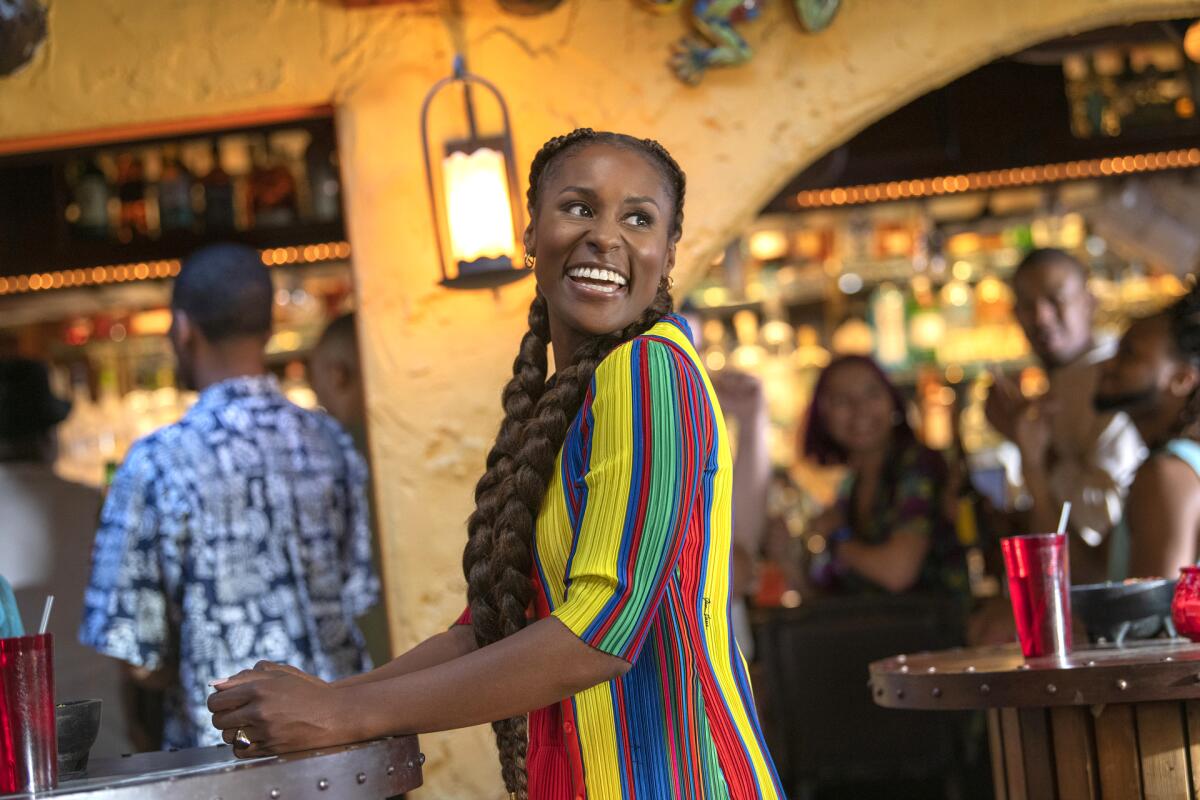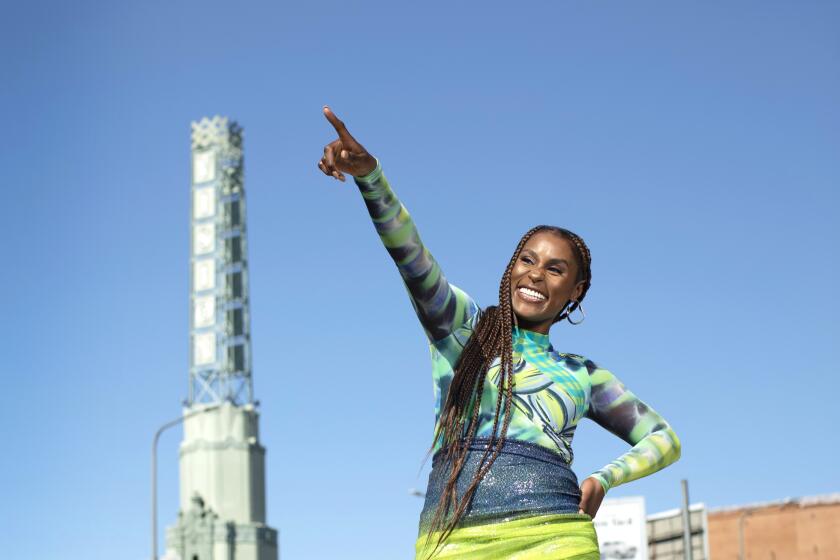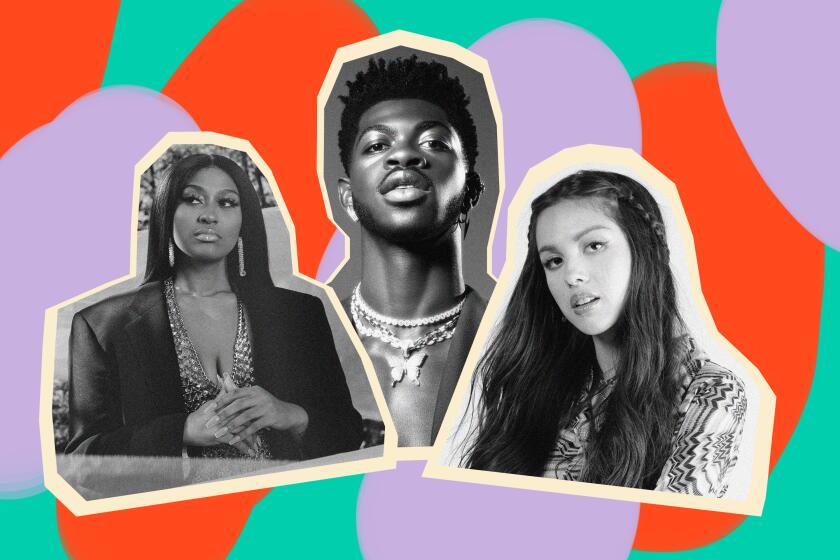Issa Rae on the music business: ‘It’s an abusive industry... it needs to start over’

- Share via
Before she had a finished script, a committed cast or even a solid sense of where her characters might go, Issa Rae knew that “Insecure” would have a killer soundtrack.
“That was the only thing I was certain of,” says the actor, writer and producer behind the beloved HBO series about a group of young Black women navigating work, romance and friendship in South Los Angeles. “In anything I do, I’m very confident that the music will assist the storytelling,” she adds, then laughs. “I’m not always confident in the story itself.”
With “Insecure,” set to conclude Sunday night with a highly anticipated series finale, Rae, 36, wanted to channel the spirit of some of the classic soundtracks of the 1990s, “when music really, really mattered in movies and television shows,” as she puts it. As examples, she points to “Boomerang,” “Soul Food,” “Love Jones” and “Waiting to Exhale.”
With her HBO comedy, Issa Rae set out to tell a different kind of story about her hometown. She and other key creatives look back on how they did it.
Now she’s leaving behind a classic of her own: For five seasons, “Insecure” has showcased what the series’ music supervisor, Kier Lehman, calls “modern alternative R&B,” long on breathy vocals and vibey production that lend valuable emotional detail to the show’s layered storylines. Artists featured on “Insecure’s” several soundtrack albums — as well as an official Spotify playlist with nearly 200,000 followers — have included established acts such as SZA, Thundercat and Jazmine Sullivan, who recorded a steamy duet called “Insecure” with Bryson Tiller for Season 2.
Yet the show has also served as a crucial incubator for emerging artists, including many from L.A.
“I never get more texts than when my music is on ‘Insecure,’” says TeaMarrr, a singer and rapper with a jazzy, Billie Holiday-ish lilt. “It’s confirmation that I’m supposed to be here and that I’m doing what I’m supposed to do.” Last week, TeaMarrr appeared with two other “Insecure” alums — B.K. Habermehl and Nnena — in an NPR Tiny Desk Concert filmed at Inglewood’s Hilltop Coffee + Kitchen, of which Rae is part owner.

As the show ends, Rae plans to carry on in music with Raedio, an “audio everywhere company,” as she calls it, that includes a record label (partnered with Atlantic Records) and a music-supervision department currently at work on “Rap Sh*t,” an upcoming HBO Max series from Rae’s Hoorae Media about a pair of struggling rappers from Miami.
Rae recently spoke about “Insecure’s” musical legacy, her impressions of the record industry — and which song was robbed of a major nomination for next month’s Grammy Awards. These are excerpts from our conversation.
What are you most proud of in terms of how “Insecure” has handled music?
We highlighted female singers and rappers in a distinct way when others weren’t — I’m thinking about TT the Artist and Kari Faux in Season 1. Also the way we put sex scenes and Black lovemaking on the map in a new way. I love adding music to those scenes, deciding which ones will affect how the audience may feel. Episode 8 of the last season, I always say that’s my opus because I wanted every song to represent the romanticism.
Does “Insecure” have a signature sound?
I’ve heard people say that, and it’s so flattering. They’ll name a song and be like, “This sounds like something that should be on ‘Insecure.’” Such a high compliment.
Was elevating up-and-comers always part of the equation?
That was one of the mandates — L.A. artists, independent artists. Kier has put me on to so many new artists that I felt get the sound of the show. And then, of course, I do my own digging for people that I love. As a music lover, nothing excites me more than feeling like you’re on to an artist first.
How did you experience music growing up in L.A.?
I remember when 2Pac died and that fueling so much pride in West Coast music. Artists like Suga Free and DJ Quik and Dr. Dre — that was a representation of my city and such a distinct sound. No other city was making the sounds of L.A. music.
R&B testimonials, teen confessionals, hip-hop in pop-star drag and more, in a wide-open year for breakthroughs.
Did you go to concerts as a kid?
No! I kind of kick myself for that. But I’ve never been one to seek out shows because music is so personal to me. And I just love the recorded version of things. Sometimes I’ll be disappointed: “I really f— with that riff, and they didn’t do it the same as I remember it.”
You’ve spent a minute in the music biz now. Does it strike you as a place where good ideas flourish?
Absolutely not. It’s probably the worst industry that I have ever come across. I thought Hollywood was crazy. The music industry, it needs to start over. Conflicts of interest abound. Archaic mentalities. Crooks and criminals! It’s an abusive industry, and I really feel for artists that have to come up in it.
Was that a surprise to discover?
It was kind of shocking. I don’t want to get too specific, but even in crafting our own deals [for soundtracks] with labels or artists, it would be so convoluted. And finding out how artists were treated at other labels… Being a creator myself and knowing what I want in terms of a relationship with a production company or a producer, I’d like to think that we’re more artist-friendly than a lot of other labels and companies out there. I want to revamp things.

The past few years have been big for women in hip-hop and R&B. Does that inspire you?
Do I feel inspired? I honestly don’t know. I love the idea that female artists are, in a sense, getting their due, but it still feels like there’s only a very specific type of sound. What really bums me out — and this aligns with Hollywood — is the way that music is rewarded. When I think about the Grammys and these other systems that are designed to reward artistic creativity and uplift artists, I just feel like, “Y’all don’t get it. What are you rewarding?”
This is dumb, but I’ll say it anyway: A song like [Wizkid’s] “Essence” — just absolutely a powerhouse, and yet could not be properly acknowledged by the institution that is supposed to celebrate the best in music — that trips me out. To see Black people and our contributions to music not celebrated in the way they should be — I mean, these aren’t institutions for us.
Drake recently made news by asking to withdraw his music from Grammys competition.
When you have popular artists that are openly renouncing these institutions like that — that’s empowering, and that gives voice all the way down to the bottom. Even the Golden Globes, they’re not the same at all, but they have some of the same practices, some of the same exclusive, corrupt nature. And seeing that the Golden Globes aren’t existing [as a televised ceremony] this year, I think that speaks to something larger about artists reclaiming their own voices. But we’ll see how long that lasts and what happens as a result of it.
What did you hear in 2021 that you loved?
I was so grateful to get new music from Jazmine Sullivan. I’ve really been a fan of Cleo Sol. I liked Don Toliver’s album a lot — he’s of the future.
Say another word about Jazmine. If you’ve been a fan for a while, it’s been heartening to see all the acclaim she’s gotten this year.
Jazmine — I’m getting chills thinking about her — she’s just literally pure talent. Sadly, I think that’s kind of rare in mainstream music today. That’s what people appreciate — she reminds you of this time when talent was at the forefront. I don’t want to sound like an old head or anything like that, or that I’m dissing anybody, but there’s just something so special about her voice and the relatability of her music.
Does it make you proud to have had her song “Insecure” be such a key musical moment early in the show?
Beyond proud. Especially because it had been a while — three or four years at that point — since she had released music. So to be able to have her briefly resurface with a song from our show — I mean, come on. That’s so dope.
More to Read
The biggest entertainment stories
Get our big stories about Hollywood, film, television, music, arts, culture and more right in your inbox as soon as they publish.
You may occasionally receive promotional content from the Los Angeles Times.













